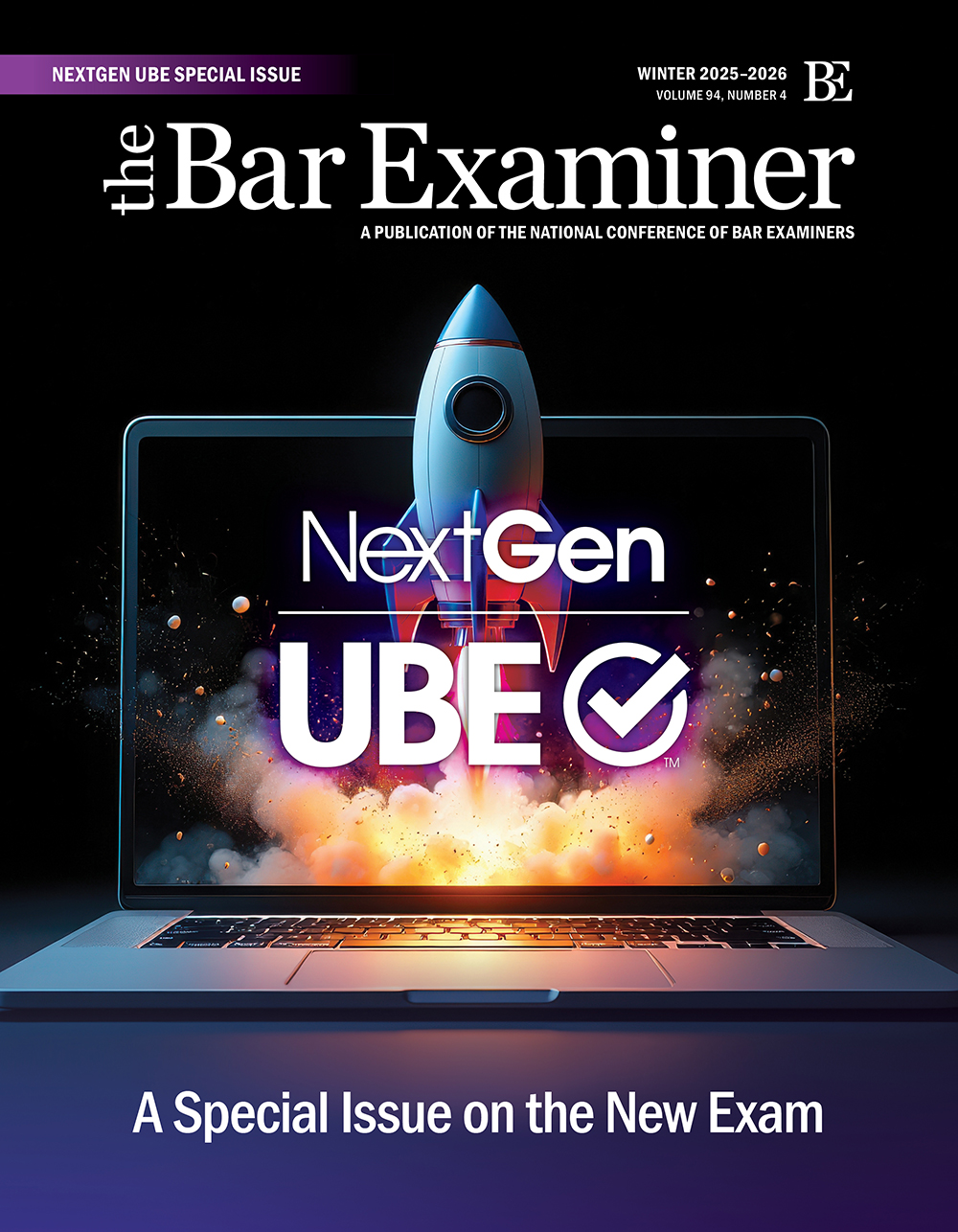By Suzanne J. Schmitz Law schools play a crucial role in preparing their students for entry into the legal profession. Beyond the academic preparation, law schools are poised to instill in their students the professional values that will serve them throughout their careers.
Law schools play a crucial role in preparing their students for entry into the legal profession. Beyond the academic preparation, law schools are poised to instill in their students the professional values that will serve them throughout their careers.
The American Bar Association’s Standards and Rules of Procedure for Approval of Law Schools state that law schools must “apprise entering students of the importance of determining the applicable character, fitness, and other requirements for admission to the bar,” help students develop a professional identity, and teach students about bias, cross-cultural competency, and racism.1 Many legal professional groups have urged law schools to “provide students with an appreciation for the broader concept of professionalism.”2 The Carnegie Foundation’s study on legal education, culminating in the 2007 publication Educating Lawyers: Preparation for the Profession of Law, commonly known as the Carnegie Report, recommended “an apprenticeship of identity and purpose, [which] introduces students to the purposes and attitudes that are guided by the values” of the profession.3 And Deborah L. Rhode, a leading professional ethics professor, writes, “students should acquire the habits of mind and ethical values that will serve the public in the pursuit of justice.”4
Forming a professional identify requires more than exhorting students to be honest, diligent, and proficient in the use of good judgment in their personal and financial affairs. It requires giving context and definition to such values. When law schools give meaning to such characteristics as trustworthiness, reliability, and integrity—terms often used in describing essential eligibility and moral character and fitness requirements for admission to the bar5—by defining learning objectives, they can create a culture in which these objectives are lived.
In my experience on the Illinois Board of Bar Admissions and, prior to that, as a clinical faculty member and director of the Academic Success Program at Southern Illinois University School of Law, I have seen firsthand the opportunities to create such a culture.6 Based on my experience, I offer the following objectives for law students and law schools that I believe are essential to fostering a culture of professionalism.
Objectives for Law Students—and Some Ways Law Schools Can Help
Commit to justice and the American legal system. Law students should understand the American legal system, its role in a democracy, and the lawyer’s role in the legal system. Law students should understand the contributions of and deficiencies in the justice system and their role as public citizens working for its improvement. Law students should show respect for the law in their professional and personal lives and should participate in programs for the improvement of the justice system.
To support law students in meeting this objective, law schools must offer a sound foundation in understanding the American legal system, especially because many students will have had no coursework on the legal system prior to entering law school. Required courses or other required programs can introduce students to the values of the legal system and the contributions of American lawyers. Additionally, there are simple means of integrating this foundation into the first-year program. Property Law professors could devote just 15 minutes of class time to explaining the origins of the British-American common law system. Criminal Law professors could focus on justice, deterrence, and punishment in the legal system.
Law faculty and administrators should provide opportunities for practical experiences in the legal system through clinical programs, pro bono programs, exchanges with lawyers about their activities in public service and professional associations. Law schools should offer mentoring with lawyers engaged in government and public interest work.
All of these activities will support students in achieving the objective of understanding the legal system—but the most important factor is modeling by law professors who educate about the legal system, its contributions, and its limitations.
Be responsible. Law students should accept responsibility for their education by attending class regularly, on-time and prepared, and by seeking assistance when needed. They should work toward continuous improvement and pursue and accept appropriate feedback. Law students should accept responsibility for their behavior, including instances of misconduct, and should rectify any misconduct.
Be honest and trustworthy. Law students should observe all rules governing exams and assignments. Law students should understand the meaning of plagiarism and properly attribute others’ work when preparing their own.
Be diligent and reliable. Law students should complete class preparation and assignments on a timely basis, balancing responsibilities to themselves and their families with the demands of the profession.
Law professors support students in meeting these objectives when they state clearly the rules concerning assignments and exams and when they teach about plagiarism and the need to appropriately attribute others’ work. They should set reasonable deadlines and requirements and define the consequences of failing to meet them.
Law school faculty and staff have a responsibility to counsel law students about any misconduct and refer them where appropriate for other interventions. Law school faculty and staff, as well as students, should report instances of dishonesty, such as cheating on exams and assignments, or plagiarism. Law school professors and administrators must design procedures for reporting instances of misconduct that respect the rights of those accused as well as those making a report. These processes might offer progressive discipline, giving priority to education and remediation over punishment, while setting the expectation of growth in professional conduct. Rather than shying away from intervention, law schools should structure the disciplinary process to provide students meaningful opportunities to demonstrate their personal growth during the bar admissions process.
Be respectful. In and out of class, law students should respect others, regardless of status or background. When working in groups, law students should contribute to the group, support its members, put group goals ahead of their own, disagree with respect, and cooperate to resolve disputes. Law students should treat potential employers with respect and honor commitments made to potential or actual employers.
Law students, professors, staff, and administrators should model respect and state disagreements in terms of issues or problems and not in terms of persons. Everyone in the school should develop cultural competence and an appreciation for diverse perspectives. With the involvement of student groups, law schools should design a forum by which students and faculty can identify instances of misconduct and dialogue about the effect of these instances and work toward a better understanding of cultural differences and respect for diverse value systems.
When assigning group work, law professors should integrate a process for assessing students’ ability to work as a team.
Law school career counselors should educate law students about the importance of these topics and more, including appropriate conduct during employment interviews and observing appointments in a timely manner.
Use good judgment about financial and personal affairs. Law students should meet their financial obligations and ideally prepare annual financial budgets, planning throughout law school for postgraduation costs, including preparation for the bar exam and the employment search.
Law school financial offices should counsel law students about financial planning and offer programs on financial literacy aimed at law students’ needs. Those who assist students in preparing for admission to the bar should educate students about the associated financial costs.
Be discreet and practice confidentiality. Law students should respect fellow classmates’ privacy and avoid rumors or gossip. Law students with access to client information must treat the information confidentially. In seeking assistance with client matters, they must protect client confidences.
Faculty and administrators should educate students about the need to respect client confidences.
Understand the rules of professional conduct. Law students should learn and adhere to the rules of professional conduct for the law school and the profession, as stated in the American Bar Association’s Model Rules of Professional Conduct,7 and should seek mentoring from established legal professionals. Law students should avoid conflicts of interest regarding loyalty to clients with respect to volunteer work, clinical work, and paid employment.
In seeking admission to the bar, law students should fully, accurately, and honestly comply with admission requirements, cooperate with bar admission authorities, and respect the staff of the bar admissions office and the Court.
Law school professors and administrators should require that the teaching of professional ethics and discussion of issues related to justice pervade the curriculum8 and should provide law students with mentoring and other opportunities to appreciate the values of the profession.
Law school deans should honestly and completely report instances of misconduct to bar authorities and respond promptly to bar authorities when asked for more information about students. Faculty should fully respond to requests from bar admission authorities. When asked to be references for employers, law professors should agree to do so only when they are honestly able to report on the student’s conduct. They should inform students about that policy.
Practice self-care. Law students should care for their mental and physical health and should observe health protocols. Law students should seek help when needed for issues such as stress, anger management, anxiety, substance abuse, or mental health concerns.
Law schools should encourage self-care by organizing activities; for instance, health education programs and speakers, “law school night at the gym,” yoga classes, or daily walks or jogs. Law school administrators should promote the use of programs such as Lawyers Assistance Programs for law students and counseling through the law school, university, or related entity.
This discussion of law student learning objectives and the means by which law schools support that learning is only a start. Law schools can identify additional professional values needing definition, further clarify the behaviors expected, and add objectives that aim to fulfill the mission of the school. They can more clearly design the culture of the professional law school.
Challenges
One challenge is that many entering law students have not had prelaw classes or classes where the role of the lawyer was examined. Law schools have the opportunity to educate them. Even those versed in the legal system can benefit from additional education and reflection on the purpose of the legal system. Education requires more than a talk at orientation. Statements about objectives, such as those offered here, should permeate the law school climate, appear on the law school website and promotional materials, and be at the forefront of communications with students. The walls, real or virtual, of the law school sing out with the values of the profession as well as opportunities to improve it.
Another challenge is securing the agreement of law school faculty to teach and embody these standards as part of their duties, along with teaching the curriculum, scholarship, and service. Faculty must be willing to see themselves as models of professionalism. They must resist the temptation, literally or figuratively, to “close the office door.” Tenure and promotion committees should recognize and support faculty who view modeling professionalism as part of their role. They should define teaching to include providing students with feedback on their performance and counseling students about the profession. Faculty designing teacher evaluation forms should account for professionalism as part of the teaching role.
A third challenge lies with law school administrators, university administrators, boards of trustees, and alumni. Law students and faculty must know that when they take the time and make the effort to hold students responsible, and accept potential backlash, they will have the support of these administrators and others associated with the law school. Administrators cannot look the other way or minimize misconduct in order to balance the budget, fill seats, create a consumer-friendly environment, or avoid negative publicity. Bar admission committees must be able to rely on law school faculty and administrators, whose knowledge of individual students, as the Conference of Chief Justices has pointed out, “is generally superior to that of bar admissions reviewers.”9
Another challenge is measuring success. Faculty and administrators can define the learning objectives in measurable terms. For example, measurements could include more students participating in pro bono or other activities that promote the search for justice, more students submitting assignments on time, fewer instances of disrespect as reported by students, and fewer instances of plagiarism as reported by faculty.
A final challenge is that all involved must be patient and resilient. It takes time to create a culture and even more time to maintain it.
Implementation
In her text on professional responsibility, Rhode recommends teaching ethics through the pervasive method—that is, introducing ethical situations throughout the curriculum, and not just in a course on the legal profession.10 Rhode reports that “research … finds that well designed courses can improve capacities for ethical reasoning.”11
The Carnegie Report adds that higher education can “promote the development of more mature moral thinking,” but this requires an explicit effort by law schools.12 The report argues that for law students to be the most prepared for their profession, schools must integrate the three goals of legal education: legal knowledge and analysis, practice skills, and professionalism.
This must be a grassroots, “whole of the school” commitment. Law schools should invite faculty, staff, and administrators to unite in all-school projects translating professional values into specific learning objectives. Administrative assistants, financial aid advisors, bar preparation staff, and career counselors, as well as many others in the school, play a significant role if this culture is to be truly lived. Given the role that law professors play in the life of the students, they must lead the challenge, with the support and encouragement of the law school administration.
Helpful Resources
In addition to the sources discussed here, two resources are of particular value to the law school community. The law school community might begin by studying the Association of American Medical Colleges’ Core Competencies for Entering Medical Students (see the sidebar).13 While these competencies are directed at entering medical students, they are useful in designing objectives for matriculated law students as well. For instance, incoming medical students are expected to show proficiency in service orientation, cultural competence, reliability and dependability, ethical responsibility to self and others, and resilience and adaptability, along with competencies in thinking, reasoning, and science. Considering the core competencies for entering students in other professions can be useful in deciding on such competencies for entering law students.
Second, the law school community will find assistance in drafting learning objectives for professionalism from the Holloran Center at the University of St. Thomas School of Law.14 The Center provides research, curriculum development, and programs that focus on the transformation of students, as well as practicing professionals, into ethical leaders in their communities; in fulfilling its mission, the Center addresses how higher education can most effectively foster each student’s ethical professional transformation. Among the resources it provides, the Center sponsors workshops to discuss pedagogies to foster professional formation and to work on plans to integrate this topic into the classroom and curriculum. The Holloran Center can help in defining objectives more precisely than has been presented here. It advises on the need to refine objectives for all students, from the novice through the expert learner and offers links to the work of other law schools in this area.
Conclusion
Law students who live in a culture of professionalism for three years are well on their way to understanding the value of the profession and to living those values. The keys to creating the culture of professionalism are involving the entire law school community, defining professionalism in behavioral terms, and living it continually. Finally, the law school community must constantly revitalize this culture, introducing it to each incoming class but also to each new employee, faculty member, staff member, and administrator.
Notes
- American Bar Association, 2022–2023 Standards and Rules of Procedure for Approval of Law Schools, Standards 504(b), 303(b)(3), 303(c), available at https://www.americanbar.org/groups/legal_education/resources/standards/. The Standards, promulgated by the Council of the ABA Section of Legal Education and Admissions to the Bar, establish requirements for providing a sound program of legal education, with which ABA-approved law schools must comply to obtain and retain ABA accreditation. (Go back)
- Conference of Chief Justices, A National Action Plan on Lawyer Conduct and Professionalism: A Report on the Working Group on Lawyer Conduct and Professionalism (1999) at 7, available at https://ccj.ncsc.org/resources/reports/national-action-plan. See also William M. Sullivan et al., Educating Lawyers: Preparation for the Profession of Law (The Carnegie Foundation for the Advancement of Teaching 2007); American Bar Association Section on Legal Education and Admissions to the Bar Professionalism Committee, Teaching and Learning Professionalism: Report of the Professionalism Committee (1996); Mark C. Palmer, “Making Civility Education a Law School Standard,” 2civility.org, August 3, 2016, available at https://www.2civility.org/making-civility-education-law-school-standard/. (Go back)
- Sullivan et al., supra note 2, at 28. (Go back)
- Deborah L. Rhode, In the Interests of Justice: Reforming the Legal Profession (Oxford University Press 2000) at 186. (Go back)
- See, e.g., Ct. Reg. Sec.2-5A; ID. R. 201; Neb. R. 3-112; NJ Reg 202; SD R 16-16-1.1. (Go back)
- For instance, the “live like a lawyer” challenge issued each fall at Illinois law schools as part of the Commission on Professionalism’s orientation program provides an opportunity for beginning law students to ask themselves the professional identity question of what it means to live like a lawyer. See Michelle Silverthorn, “Carnegie Report 10 Years Later: Live Like a Lawyer,” 2civility.org, August 26, 2016, available at https://www.2civility.org/carnegie-report-live-like-lawyer/. (Go back)
- American Bar Association, Model Rules of Professional Conduct, available at https://www.americanbar.org/groups/professional_responsibility/publications/model_rules_of_professional_conduct/model_rules_of_professional_conduct_table_of_contents/. (Go back)
- Deborah L. Rhode, Professional Responsibility: Ethics by the Pervasive Method, 2d ed. (Aspen Law & Business 1998); Sullivan et al., supra note 2. (Go back)
- Conference of Chief Justices, supra note 2, at 8. (Go back)
- Rhode, supra note 8. (Go back)
- Rhode, supra note 4, at 202. (Go back)
- Sullivan et al., supra note 2, at 134. (Go back)
- Association of American Medical Colleges, Core Competencies for Entering Medical Students, available at https://students-residents.aamc.org/applying-medical-school/article/core-competencies. (Go back)
- University of St. Thomas School of Law, Holloran Center, https://www.stthomas.edu/hollorancenter/. (Go back)
Core Competencies for Entering Medical Students
The Association of American Medical Colleges cites the following skills, knowledge, and abilities that successful medical school applicants can demonstrate.
Preprofessional Competencies
Capacity for Improvement
Sets goals for continuous improvement and for learning new concepts and skills; engages in reflective practice for improvement; solicits and responds appropriately to feedback.
Cultural Competence
Demonstrates knowledge of sociocultural factors that affect interactions and behaviors; shows an appreciation and respect for multiple dimensions of diversity; recognizes and acts on the obligation to inform one’s own judgment; engages diverse and competing perspectives as a resource for learning, citizenship, and work; recognizes and appropriately addresses bias in themselves and others; interacts effectively with people from diverse backgrounds.
Ethical Responsibility to Self and Others
Behaves in an honest and ethical manner; cultivates personal and academic integrity; adheres to ethical principles and follows rules and procedures; resists peer pressure to engage in unethical behavior and encourages others to behave in honest and ethical ways; develops and demonstrates ethical and moral reasoning.
Oral Communication
Effectively conveys information to others using spoken words and sentences; listens effectively; recognizes potential communication barriers and adjusts approach or clarifies information as needed.
Reliability and Dependability
Consistently fulfills obligations in a timely and satisfactory manner; takes responsibility for personal actions and performance.
Resilience and Adaptability
Demonstrates tolerance of stressful or changing environments or situations and adapts effectively to them; is persistent, even under difficult situations; recovers from setbacks.
Service Orientation
Demonstrates a desire to help others and sensitivity to others’ needs and feelings; demonstrates a desire to alleviate others’ distress; recognizes and acts on his/her responsibilities to society, be it locally, nationally, and globally.
Social Skills
Demonstrates an awareness of others’ needs, goals, feelings, and the ways that social and behavioral cues affect peoples’ interactions and behaviors; adjusts behaviors appropriately in response to these cues; treats others with respect.
Teamwork
Works collaboratively with others to achieve shared goals; shares information and knowledge with others and provides feedback; puts team goals ahead of individual goals.
Science Competencies
Human Behavior
Applies knowledge of the self, others, and social systems to solve problems related to the psychological, sociocultural, and biological factors that influence health and well-being.
Living Systems
Applies knowledge and skill in the natural sciences to solve problems related to molecular and macro systems including biomolecules, molecules, cells, and organs.
Thinking and Reasoning Competencies
Critical Thinking
Uses logic and reasoning to identify the strengths and weaknesses of alternative solutions, conclusions, or approaches to problems.
Quantitative Reasoning
Applies quantitative reasoning and appropriate mathematics to describe or explain phenomena in the natural world.
Scientific Inquiry
Applies knowledge of the scientific process to integrate and synthesize information, solve problems and formulate research questions and hypotheses; is facile in the language of the sciences and uses it to participate in the discourse of science and explain how scientific knowledge is discovered and validated.
Written Communication
Effectively conveys information to others using written words and sentences.
Source: Association of American Medical Colleges, Core Competencies for Entering Medical Students, https://students-residents.aamc.org/applying-medical-school/article/core-competencies.
 Suzanne J. Schmitz serves on the Illinois Board of Bar Admissions. She is also Professor Emerita at Southern Illinois University School of Law, where she served as a clinical faculty member and as director of the Academic Success Program.
Suzanne J. Schmitz serves on the Illinois Board of Bar Admissions. She is also Professor Emerita at Southern Illinois University School of Law, where she served as a clinical faculty member and as director of the Academic Success Program.
This article originally appeared in The Bar Examiner print edition, Winter 2022–2023 (Vol. 91, No. 4), pp. 18–23.
Contact us to request a pdf file of the original article as it appeared in the print edition.








